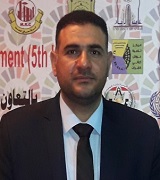| News Details |
Knowledge Investment
2022-06-21

Dr. Omar Yaseen Neda
Head of human resources department / Upper Euphrates Basin Development Center
Almighty Allah has honoured man, made him the main element on earth, and even entrusted him with its architecture, and provided him with the necessary tools to be the caliph; Allah sais (when your Lord said to the angels, "Indeed, I will make upon the earth a successive authority) Al-Baqarah 30. One of the many meanings that explains the caliph's term is to refer to those who take over a work run by the successor, such as the agent and guardian, i.e. to make in the earth a mastermind who does what we want in it, or as stated in the interpretation of Al-Tabari: the caliph who inhabits and builds it, and this succession is closely linked to what Allah has made to the man, as the almighty Allah sais (And He has subjected to you whatever is in the heavens and whatever is on the earth) Al-J?thiyah 13. This harness therefore places man in front of a great responsibility that requires him to think and reflect on the management of what has been assigned to him, and the effective tool for reflection is the tested mind and the compass of survival.
We find that man has employed the mind to acquire the knowledge that has accompanied him since he was on its back, and elevated him and him from its primitive levels to the height of its present climax, and the meditator in history finds that the development and prosperity of civilizations was the result of the scientific and cognitive level of their peoples.
In recent decades, this role played by knowledge in the advancement and development of societies has grown into an essential resource for the economies of many States in parallel with natural resources, employing knowledge, for example, in revolutionizing informatics, communications technology and other areas, which have enabled them to keep pace with the global renaissance, although most do not have sufficient natural resources.
Scientists have developed several definitions of knowledge, including "information mixed with experience, facts, judgments and values that work together as a unique structure that allows individuals and organizations to create new situations and manage change." From this emerged the concept of making knowledge one of the pillars of the economy, called "knowledge capital", which represents the range of capabilities, experience and knowledge of workers in any organization so that these two elements (knowledge and experience) are distinct and have no counterpart with another organization, They are, of course, the economic resources of that organization, and they have placed advantages on those who represent knowledge capital:
· Perseverance and mastery of work.
· Enjoy high confidence in work.
· The tendency to take risks in starting work to a large extent.
· To provide constructive ideas with the aim of seeking innovation, creativity and innovation.
· A tendency to know and not to be rigid.
Are our institutions devoid of categories of these advantages? Their energies are invested and employed to serve the common good and to raise the state of institutional inertia, which has become a common feature and reality that weighs the economy, weakens the concerns and makes minds in a state of silence that they get used to over time. Or is the educational system unable to graduate competencies that run these institutions and invest resources (don't sell them to eat)? Questions we ask ourselves at the same time, and at the same time we look at who we are and what Allah has entrusted us with after believing in him, and the succession on earth and its architecture.
The possession of resources is not an advantage in the light of current variables and in the face of nations' ownership of wealth, but has become a goal that attracts the greedy, and an easy resource in the eyes of the non-specialty people, and the absence of the role of minds and reclining on the variable that comes out of the ground leads us to neglect reason and knowledge, which Allah has distinguished us from other creatures.
References:
- Ibn Ashour, Mohamed Taher: Interpretation of Liberation and Enlightenment, Tunisian Publishing House, Tunisia, 1984.
- Al-Tabari: Jama al-Bayan on the interpretation of Qur'an phrases, Al-Resala Foundation, Beirut, 1994.
- Al-Rabghi, Khalid Mohammed bin Mahmoud: The Habits of Reason and Motivation of Achievement, Debono Thinking Center, Amman, 2015.
- Amer, Abdul Rahman Kassab: Knowledge Capital, Dar Al-Kitab for Publishing and Distribution, Cairo, 2014.









